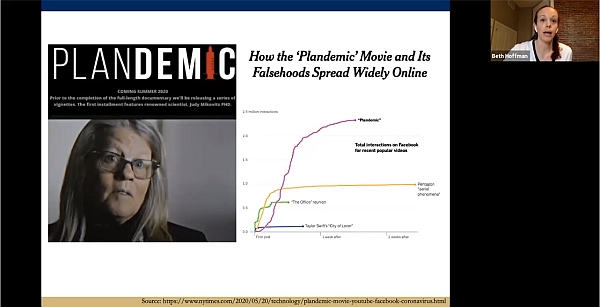
Understanding and Addressing the COVID-19 Infodemic (May 29)
Since the initial outbreak of the novel coronavirus COVID-19, social media misinformation appears to be spreading faster than the virus itself, prompting the WHO to declare an "infodemic" of misinformation. During this conversation, BCHS's Steve Albert and Beth Hoffman (BCHS '19 '23) will discuss how COVID-19 related misinformation fits within the framework of science denialism, and provide strategies to help public health professionals and others accelerate the transmission of accurate scientific information related to the pandemic.
Watch on YouTube or click below
Additional Q and A from the 5/29 seminar
- To both speakers: what are your thoughts on using fact-checking or warning labels on social media posts? Many of the personal posts could contain misleading opinions but not necessarily misinformation claims. What would be your suggestions on possible social media interventions? Like what Twitter is now doing.
Social media companies have a role to play in helping to prevent the spread of misinformation, and it is good to see companies like Twitter labeling misleading and potentially harmful messages. It is important that these policies be instituted for all social media users, including political leaders.
- How can we depoliticize science so that our arguments for science and evidence are not viewed as an arm of either political party?
This is a great question, and a difficult one to answer. Unfortunately, our President and others have politicized the pandemic and the science. One idea is to have scientists themselves be more vocal and communicate directly with the public and policy community about the implications of their research. Hopefully, that will help the public better understand what policies and actions the science and evidence support independent of its attacks on ideological grounds.
- What do you have to say about publications coming on biorxiv preprint as the scientific community rushing towards finding a solution than it would generally take much longer for peer reviewed publications responsible for spread of misinformation?
For the most part, it seems that the dissemination of pre-prints has been problematic. Many pre-prints or even rapidly published manuscripts have been found to have flaws in study design or have been retracted, leading to increased confusion among the public and policy makers as to what is considered evidenced-based.
- What do you do with educated people (with a master degree) who still tend to believe in conspiracy theories that spread untruths, peppered with scientific phrases? I am thinking of the post about Italian doctors finding out that COVID is a bacteria after they did autopsies against the orders of the WHO?
This has been a problem we have also seen with anti-vaccine activists such as Andrew Wakefield. It is important for credible scientists to communicate with the public because if we are not out there providing this information, those promoting misinformation will fill the void.
- I think there is a distrust in the data that is being presented. For example, does the US have more cases or are we just reporting more cases that other countries. How do you build trust to people to believe in the data being presented?
This is a great example of why we need broad investments in media and scientific literacy education. If we can empower people with the skills to understand the data being presented as well as the ways in which data can be distorted to fit a headline or for a political purpose, it may help improve their confidence in the data and the scientific process.
- Is there potential for using the model of the WWII Homefront war effort to fight COVID? (Allowing for the fact that the political landscape is totally different.)
It may be hard with the current political landscape, but this is a great analogy that could be very useful.
- Pitt's College in High School program works with 140 high schools. If there is any interest in working with high schools, please contact me. giazzoni@pitt.edu
Thank you – this sounds like a great way to promote scientific and media literacy education in high schools.
Answers prepared by Beth Hoffman
For further reading, view the Insider article featuring Hoffman and mentioned during the webinar.
Each Friday this May and June, Pitt Public Health experts will have a conversation about different aspects of the COVID-19 pandemic and then address questions from the seminar attendees. The goal of the COVID-19 seminar series is to provide our school community, alumni, and the public with credible information about the virus and the associated health impacts.
5/30/2020